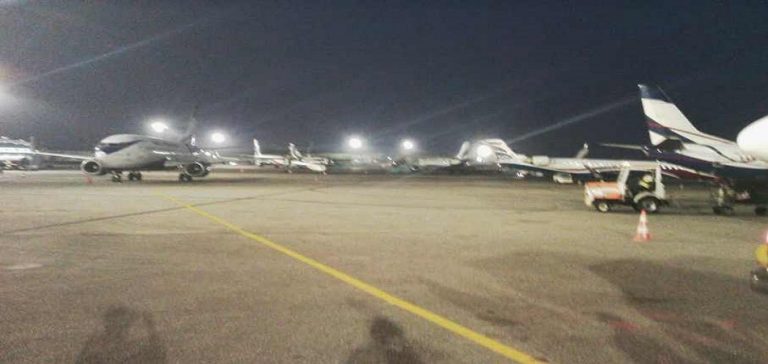
The International Air Transport Association (IATA) has provided an optimistic update regarding the issue of airline funds trapped in Nigeria, confirming that 98% of these blocked funds have now been cleared.
At the height of the problem in June 2023, Nigeria’s blocked airline funds amounted to a substantial $850 million, severely impacting airline operations and financial stability.
As of April 2024, the remaining balance stands at $19 million, pending the Central Bank of Nigeria’s (CBN) verification of outstanding forward claims filed by commercial banks. This marks a significant improvement from the previous year and demonstrates the effectiveness of recent efforts by the Nigerian government and the CBN.
Register for Tekedia Mini-MBA edition 19 (Feb 9 – May 2, 2026): big discounts for early bird.
Tekedia AI in Business Masterclass opens registrations.
Join Tekedia Capital Syndicate and co-invest in great global startups.
Register for Tekedia AI Lab: From Technical Design to Deployment (next edition begins Jan 24 2026).
The situation had led to notable disruptions in airline services. UAE carrier Emirates was among the most affected, leading it to suspend its flights to Nigeria in August 2022. The airline cited difficulties in repatriating revenues in US dollars, which were trapped due to Nigeria’s foreign exchange regulations.
Emirates, which had been operating flights to both Lagos and Abuja, faced significant financial strain as it was unable to access its earnings from ticket sales in Nigeria. This forced the airline to adjust its operations drastically, including halting ticket sales for lower-priced fare classes.
Emirates’ suspension of flights not only disrupted travel plans for many Nigerians but also had broader implications for the country’s connectivity and investment prospects. The airline is only planning to resume services in October 2024, indicating the severity of the impact and the cautious approach to re-entering the market.
IATA played a crucial role in highlighting the issue of blocked funds in Nigeria. In several statements, IATA’s Director-General Willie Walsh emphasized the detrimental impact of blocked funds on airline operations and the broader economic consequences. At one point, the association threatened to boycott Nigeria, warning that continued restrictions on fund repatriation could lead to a withdrawal of international airlines from the Nigerian market. Such a move would have severely affected Nigeria’s air connectivity, international trade, and tourism.
IATA’s threats underscored the urgency of the situation and pressured the Nigerian government to take decisive action. The association argued that unrestricted access to revenues is essential for airlines to maintain services and invest in improving connectivity.
Central Bank of Nigeria’s Efforts
In March 2024, the Central Bank of Nigeria (CBN) announced that it had successfully cleared the entire valid foreign exchange (FX) backlog, marking a significant milestone in the nation’s fight against FX volatility. This accomplishment, long-awaited and ardently pursued, was formally announced by Mrs. Hakama Sidi Ali, the Bank’s Acting Director of Corporate Communications.
Mrs. Ali’s announcement came as part of the CBN’s steadfast commitment to addressing the substantial backlog of outstanding FX claims inherited by the CBN Governor Mr. Olayemi Cardoso, totaling an estimated $7 billion.
However, foreign airlines operating in Nigeria contested the CBN’s claims. Kingsley Nwokeoma, President of the Association of Foreign Airlines and Representatives in Nigeria (AFARN), adamantly stated that there has been no discernible change regarding the clearance of foreign airlines’ trapped funds.
“If they say they have cleared the trapped funds, they should show us figures. They should tell us how much have been cleared. The last I checked, the status quo still remains the same,” Nwokeoma told BusinessDay.
Two months after the CBN’s announcement, IATA has acknowledged a significant part of the withheld fund has been cleared, noting the progress made in resolving the issue.
“We commend the new Nigerian government and the Central Bank of Nigeria for their efforts to resolve this issue. Individual Nigerians and the economy will all benefit from reliable air connectivity for which access to revenues is critical. We are on the right path and urge the government to clear the residual $19 million and continue prioritizing aviation,” said IATA Director-General Willie Walsh.
Tackling the global trend
This progress in Nigeria is part of a broader trend, as IATA reported a 28% global decrease in airline funds blocked by governments, reducing the total from $2.5 billion in December 2023 to approximately $1.8 billion by the end of April 2024. Despite this improvement, significant challenges remain, with the majority of the remaining blocked funds concentrated in a few countries.
IATA highlighted that eight countries, including Pakistan, Bangladesh, Algeria, the XAF Zone, Ethiopia, Lebanon, Eritrea, and Zimbabwe, are responsible for 87% of the remaining blocked funds. Pakistan and Bangladesh are the most affected, with airlines unable to repatriate $731 million—$411 million in Pakistan and $320 million in Bangladesh.
“Pakistan and Bangladesh must release the $731 million in blocked funds immediately to ensure airlines can continue providing essential air connectivity. In Bangladesh, the solution is in the hands of the Central Bank, which must prioritize aviation’s access to foreign exchange in line with international treaty obligations. The solution in Pakistan involves finding efficient alternatives to the system of audit and tax exemption certificates, which cause long processing delays,” said Walsh.
In Egypt, a significant clearance of blocked funds has also been achieved, albeit with airlines feeling the adverse effects of currency devaluation.



